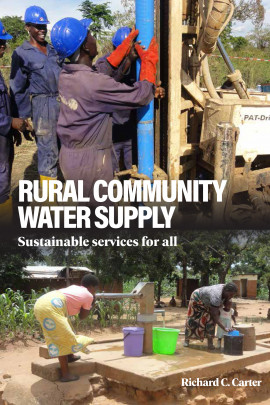by Professor Richard C. Carter
Many hundreds of millions of rural people – the exact number is not known, and it is immaterial, except that it probably lies between one and two billion – experience inadequacies in the supply of the water which they use for drinking and other domestic uses.
These inadequacies are partly reflected in the ‘normative criteria’ as defined by the human right to water which apply to water services globally. These criteria ask whether and to what extent water services are available, accessible, affordable and acceptable, and whether their quality meets national or international standards. They also highlight the importance of cross-cutting criteria (non-discrimination, participation, accountability, impact, and sustainability).
The relative importance of those criteria to water users depends on the extent to which, and the ways in which existing services fall short of some basic minimum standard – usually taken as a protected/engineered (‘improved’) water point within a 30-minute round-trip of home. This minimum level of service is now termed ‘at least basic’ in the reports of the Joint Monitoring Programme of UNICEF and the World Health Organisation.
For many rural dwellers in the 2020s, water supplies remain distant, inconvenient, often insufficient in quantity, of poor quality, and unreliable – and water has to be laboriously carried home, day after day. Approximately two-thirds of a billion rural people still do not enjoy ‘at least basic’ water services, and many of those who do cannot rely on those services because of management and financing difficulties.
I have had the privilege of working on this topic for the last 45 years. There is now better understanding of the problems than when I started out; there is more compelling evidence about what works and what can make a difference; there are new ideas and innovations; there has been much investment. And yet, there is still a long, long way to go.
Covid-19 gave me the chance to commit to paper (or electronic form, if you prefer) some of my understanding and experience gained over several decades. The outcome is a book, published earlier this year, entitled Rural Community Water Supply: Sustainable Services for All.
In the book I urge a renewed focus on getting ‘at least basic’ services to rural people who do not at present enjoy this level of service; I emphasise the importance of sound management and financing of well-engineered water technology which draws from water resources of well-understood quality and quantity. But I go further too, to encourage my readers to think about the importance of government policies, monitoring and regulation; about the need for coordinated action by all actors under the mandate and leadership of national governments; to address issues of consumer/water user engagement; and to critically examine our own individual compassion, vision, commitment and values, as well as those of the organisations we work for.
Right now there is much discussion in the rural water sector about ‘systems strengthening’, the idea that external players should focus on helping to make national institutions, policies, planning and regulatory arrangements, monitoring, management and financing – and much besides – all work together more effectively to deliver sustainable water services to all. I discuss this idea in the final chapters of the book, but in a sense the entire book is about that topic. In covering water resources, water engineering and technology, management, financing and much more, the book provides a comprehensive picture of where rural water in low- and lower-middle income countries in the final decade of the Sustainable Development Goals.
You can buy the book in hardback or paperback, or download it free-of-charge through this link .
Prof. Carter joined Cranfield University at Silsoe in 1981 after several years working for consulting companies in UK and overseas. He was appointed Professor of International Water Development at Cranfield in 2002. He has published more than 100 papers, articles and reports. In 2006, he established Richard Carter & Associates Ltd, to extend and deepen partnerships for rural development in low-income developing countries. In 2009 he took the position of Head of Technical Support at WaterAid and in 2012 returned to full-time consulting as Director of his own company. Richard was RWSN Chair from 2011 to 2014.


